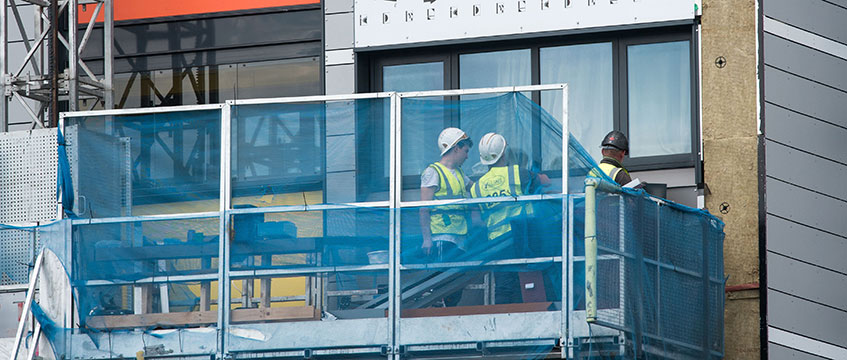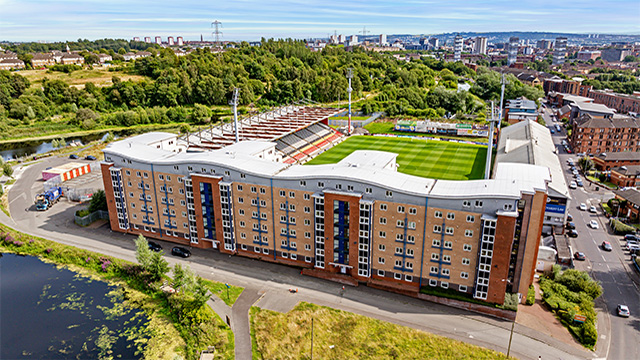Get Living appeals ‘fundamentally flawed’ decision on cladding costs
Owners of build-to-rent company Get Living have thrown their weight behind an appeal it has lodged today (16 February) against a “no-fault” decision made by the UK’s First-tier Tribunal on 19 January.
The tribunal ruled that Get Living was liable to pay £18m for remediation works to address original building safety defects at the former 2012 Olympics Athletes’ Village in Stratford, E15.
Get Living, which is owned by APG, Aware Super and Oxford Properties, believes the decision to hold it liable for costs to repair construction flaws at five buildings that it had no role in designing or developing is fundamentally flawed and that the government’s Olympic Delivery Authority, as the original developer, together with the contractors responsible for the work should be liable.
Owners of build-to-rent company Get Living have thrown their weight behind an appeal it has lodged today (16 February) against a “no-fault” decision made by the UK’s First-tier Tribunal on 19 January.
The tribunal ruled that Get Living was liable to pay £18m for remediation works to address original building safety defects at the former 2012 Olympics Athletes’ Village in Stratford, E15.
Get Living, which is owned by APG, Aware Super and Oxford Properties, believes the decision to hold it liable for costs to repair construction flaws at five buildings that it had no role in designing or developing is fundamentally flawed and that the government’s Olympic Delivery Authority, as the original developer, together with the contractors responsible for the work should be liable.
The ODA converted the Athletes’ Village into apartments, and now Get Living owns and manages the market rent homes, while Triathlon Homes owns and manages the affordable homes.
Get Living said that while it recognises the importance of the Building Safety Act in protecting leaseholders, it believes that the law is fundamentally flawed if it holds an organisation responsible for faulty construction in a building it acquired in good faith, when that organisation had nothing to do with the original development and both the original contractor and developer are currently fully able to fund the remediation.
The BTR firm said it would “vigorously pursue” the original contractors, which it says are responsible for the defects, for damages relating to flaws in their work on the Olympic Village.
The works required to these buildings, which are the subject of the remediation contribution orders, began in January 2023 and are expected to be completed in August 2025. The progress of the works will not be impacted by the legal process and the homes have been verified as safe to occupy by an independent assessor.
Building Safety Fund money has been secured and a plan is in place to use this funding on the remaining buildings at East Village that are subject to defects, meaning that no residents awaiting works have been or will be impacted by the tribunal decision or the appeal.
Damien Webb, deputy chief investment officer and head of international at Aware Super, said: “Aware Super fully supports Get Living and our partners in appealing the tribunal decision. We believe this ruling has the potential to make a significant impact on attracting investment into the UK’s BTR housing market at a time of great need.”
Abby Shapiro, senior vice president for Europe at Oxford Properties, said: “We support the goal of the Building Safety Act to protect leaseholders and residents at residential buildings requiring remediation. However, the tribunal’s decision exclusively puts the financial burden on the current owners to fund repairs that arise from construction flaws made by the original developers. Given that this decision unfairly financially punishes our pension members, who are municipal workers including firefighters and police officers who serve our communities, we have no choice other than to appeal.
She added: “We also believe that an unintended consequence of this decision, which makes current owners solely financially responsible for the mistakes of the past irrespective of whether they are found at fault, is that it will act as a barrier to ongoing investment into the UK residential sector. This will only serve to reduce the necessary capital available to help alleviate the current housing crisis.”
Get Living chief executive Rick de Blaby said: “Get Living has a responsibility to its pension fund shareholders to appeal the tribunal’s decision which lays financial liability at the wrong door, not only to protect the value of those funds that are mainly held on behalf of key workers, but also to test this unfair principle for other investors at a time when the UK has never been more in need of property investment and housing.
“The tribunal ruling itself said that Get Living is not at fault. And there is no way that Get Living’s investors could have foreseen the impact of the Building Safety Act when they first made an investment into UK housing.”
Action to remove all ACM cladding to the external facades of 14 buildings at East Village was taken in 2019. Extensive surveys of every building at East Village were also undertaken and defects relating to both the design and construction of various non-ACM cladding systems were discovered, remediation works for which are now taking place.
Photo © Roger Askew/Shutterstock











